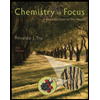
GENERAL,ORGANIC, & BIOLOGICAL CHEM-ACCES
4th Edition
ISBN: 9781265982959
Author: SMITH
Publisher: MCG
expand_more
expand_more
format_list_bulleted
Concept explainers
Question
Chapter 23, Problem 34P
Interpretation Introduction
Interpretation:
The energy which is released from the hydrolysis of GTP is to be determined.
Concept introduction:
The term hydrolysis refers to a
Expert Solution & Answer
Want to see the full answer?
Check out a sample textbook solution
Students have asked these similar questions
>
You are trying to decide if there is a single reagent you can add that will make the following synthesis possible without any other
major side products:
1. ☑
CI
2. H3O+
O
Draw the missing reagent X you think will make this synthesis work in the drawing area below.
If there is no reagent that will make your desired product in good yield or without complications, just check the box under the
drawing area and leave it blank.
Click and drag to start drawing a
structure.
Explanation
Check
?
DO
18
Ar
B
© 2025 McGraw Hill LLC. All Rights Reserved. Terms of Use | Privacy Center | Accessibility
Don't use ai to answer I will report you answer
Consider a solution of 0.00304 moles of 4-nitrobenzoic acid (pKa = 3.442) dissolved in 25 mL water and titrated with 0.0991 M NaOH. Calculate the pH at the equivalence point
Chapter 23 Solutions
GENERAL,ORGANIC, & BIOLOGICAL CHEM-ACCES
Ch. 23.2 - Prob. 23.1PCh. 23.3 - Prob. 23.2PCh. 23.3 - The phosphorylation of glucose to glucose...Ch. 23.3 - Prob. 23.3PCh. 23.3 - Use the values for the hydrolysis of creatine...Ch. 23.4 - Prob. 23.2PPCh. 23.4 - Prob. 23.5PCh. 23.4 - Prob. 23.6PCh. 23.4 - Prob. 23.7PCh. 23.4 - Prob. 23.8P
Ch. 23.5 - Prob. 23.3PPCh. 23.5 - Prob. 23.9PCh. 23.5 - Prob. 23.10PCh. 23.5 - Prob. 23.11PCh. 23.6 - Prob. 23.12PCh. 23.6 - At several points in the electron transport chain,...Ch. 23.6 - In which region of the mitochondrion-the matrix or...Ch. 23 - Prob. 15PCh. 23 - Explain why mitochondria are called the...Ch. 23 - Prob. 17PCh. 23 - Prob. 18PCh. 23 - Prob. 19PCh. 23 - Prob. 20PCh. 23 - What are coupled reactions and why does coupling...Ch. 23 - Prob. 22PCh. 23 - Prob. 23PCh. 23 - Prob. 24PCh. 23 - Prob. 25PCh. 23 - Prob. 26PCh. 23 - Prob. 27PCh. 23 - Prob. 28PCh. 23 - Prob. 29PCh. 23 - Prob. 30PCh. 23 - Prob. 31PCh. 23 - Prob. 32PCh. 23 - (a) Draw the structure of the high-energy...Ch. 23 - Prob. 34PCh. 23 - Classify each substance as an oxidizing agent, a...Ch. 23 - Classify each substance as an oxidizing agent, a...Ch. 23 - When a substrate is oxidized, is NAD+ oxidized or...Ch. 23 - When a substrate is reduced, is FADH2 oxidized or...Ch. 23 - Prob. 39PCh. 23 - Prob. 40PCh. 23 - Prob. 41PCh. 23 - Prob. 42PCh. 23 - Prob. 43PCh. 23 - Prob. 44PCh. 23 - Prob. 45PCh. 23 - Prob. 46PCh. 23 - The conversion of isocitrate to ketoglutarate in...Ch. 23 - Prob. 48PCh. 23 - Prob. 49PCh. 23 - Prob. 50PCh. 23 - Prob. 51PCh. 23 - What is the role of each of the following in the...Ch. 23 - What is the role of each of the following in the...Ch. 23 - Prob. 54PCh. 23 - Prob. 55PCh. 23 - Prob. 56PCh. 23 - Prob. 57PCh. 23 - Prob. 58PCh. 23 - Prob. 59PCh. 23 - Prob. 60PCh. 23 - Prob. 61PCh. 23 - Prob. 62PCh. 23 - Prob. 63PCh. 23 - Prob. 64PCh. 23 - Prob. 65PCh. 23 - Prob. 66PCh. 23 - Prob. 67PCh. 23 - Prob. 68PCh. 23 - Prob. 69PCh. 23 - Prob. 70PCh. 23 - Prob. 71PCh. 23 - Prob. 72PCh. 23 - Prob. 73PCh. 23 - Prob. 74PCh. 23 - Prob. 75CPCh. 23 - Prob. 76CP
Knowledge Booster
Learn more about
Need a deep-dive on the concept behind this application? Look no further. Learn more about this topic, chemistry and related others by exploring similar questions and additional content below.Similar questions
- What is the name of the following compound? SiMe3arrow_forwardK Draw the starting structure that would lead to the major product shown under the provided conditions. Drawing 1. NaNH2 2. PhCH2Br 4 57°F Sunny Q Searcharrow_forward7 Draw the starting alkyl bromide that would produce this alkyne under these conditions. F Drawing 1. NaNH2, A 2. H3O+ £ 4 Temps to rise Tomorrow Q Search H2arrow_forward
arrow_back_ios
SEE MORE QUESTIONS
arrow_forward_ios
Recommended textbooks for you
 Chemistry for Today: General, Organic, and Bioche...ChemistryISBN:9781305960060Author:Spencer L. Seager, Michael R. Slabaugh, Maren S. HansenPublisher:Cengage Learning
Chemistry for Today: General, Organic, and Bioche...ChemistryISBN:9781305960060Author:Spencer L. Seager, Michael R. Slabaugh, Maren S. HansenPublisher:Cengage Learning General, Organic, and Biological ChemistryChemistryISBN:9781285853918Author:H. Stephen StokerPublisher:Cengage Learning
General, Organic, and Biological ChemistryChemistryISBN:9781285853918Author:H. Stephen StokerPublisher:Cengage Learning Organic And Biological ChemistryChemistryISBN:9781305081079Author:STOKER, H. Stephen (howard Stephen)Publisher:Cengage Learning,
Organic And Biological ChemistryChemistryISBN:9781305081079Author:STOKER, H. Stephen (howard Stephen)Publisher:Cengage Learning, Chemistry In FocusChemistryISBN:9781305084476Author:Tro, Nivaldo J., Neu, Don.Publisher:Cengage LearningChemistry: Matter and ChangeChemistryISBN:9780078746376Author:Dinah Zike, Laurel Dingrando, Nicholas Hainen, Cheryl WistromPublisher:Glencoe/McGraw-Hill School Pub Co
Chemistry In FocusChemistryISBN:9781305084476Author:Tro, Nivaldo J., Neu, Don.Publisher:Cengage LearningChemistry: Matter and ChangeChemistryISBN:9780078746376Author:Dinah Zike, Laurel Dingrando, Nicholas Hainen, Cheryl WistromPublisher:Glencoe/McGraw-Hill School Pub Co Chemistry & Chemical ReactivityChemistryISBN:9781337399074Author:John C. Kotz, Paul M. Treichel, John Townsend, David TreichelPublisher:Cengage Learning
Chemistry & Chemical ReactivityChemistryISBN:9781337399074Author:John C. Kotz, Paul M. Treichel, John Townsend, David TreichelPublisher:Cengage Learning

Chemistry for Today: General, Organic, and Bioche...
Chemistry
ISBN:9781305960060
Author:Spencer L. Seager, Michael R. Slabaugh, Maren S. Hansen
Publisher:Cengage Learning

General, Organic, and Biological Chemistry
Chemistry
ISBN:9781285853918
Author:H. Stephen Stoker
Publisher:Cengage Learning

Organic And Biological Chemistry
Chemistry
ISBN:9781305081079
Author:STOKER, H. Stephen (howard Stephen)
Publisher:Cengage Learning,

Chemistry In Focus
Chemistry
ISBN:9781305084476
Author:Tro, Nivaldo J., Neu, Don.
Publisher:Cengage Learning

Chemistry: Matter and Change
Chemistry
ISBN:9780078746376
Author:Dinah Zike, Laurel Dingrando, Nicholas Hainen, Cheryl Wistrom
Publisher:Glencoe/McGraw-Hill School Pub Co

Chemistry & Chemical Reactivity
Chemistry
ISBN:9781337399074
Author:John C. Kotz, Paul M. Treichel, John Townsend, David Treichel
Publisher:Cengage Learning